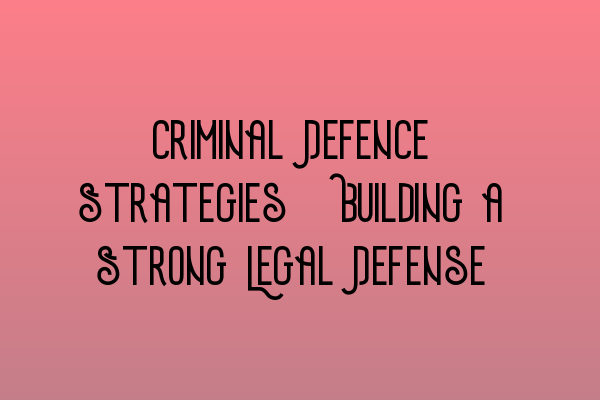Criminal Defence Strategies: Building a Strong Legal Defense
When facing criminal charges, it is crucial to have a strong legal defense strategy in place. A skilled criminal defense lawyer can help navigate the complexities of the legal system and ensure that your rights are protected. In this article, we will explore some effective defense strategies that can be used to build a strong case.
1. Establishing Reasonable Doubt
One of the most fundamental defense strategies is establishing reasonable doubt. This means creating a level of uncertainty in the minds of the jury or judge about the defendant’s guilt. It is the prosecution’s burden to prove the defendant’s guilt beyond a reasonable doubt. By raising doubts about the evidence or the credibility of witnesses, the defense can weaken the prosecution’s case.
2. Challenging the Evidence
Another effective defense strategy is to challenge the evidence presented by the prosecution. This may involve questioning the reliability of forensic tests, challenging the chain of custody of the evidence, or presenting alternative explanations for the evidence. A skilled defense lawyer will carefully analyze the evidence to identify any weaknesses that can be exploited to cast doubt on the prosecution’s case.
3. Presenting Alibi or Exculpatory Evidence
In some cases, the defendant may have an alibi or exculpatory evidence that can raise doubts about their involvement in the alleged crime. Alibi evidence establishes that the defendant was somewhere else at the time the crime was committed, making their involvement unlikely. Exculpatory evidence, on the other hand, directly undermines the prosecution’s theory of the case. Presenting this type of evidence can significantly strengthen the defense’s position.
4. Attacking the Credibility of Witnesses
The credibility of witnesses plays a crucial role in criminal trials. By attacking the credibility of prosecution witnesses, the defense can undermine their testimony and weaken the prosecution’s case. This can be done by exposing inconsistencies or contradictions in their statements, highlighting any biases or motives to lie, or presenting evidence of past dishonesty or criminal behavior. A skilled defense lawyer will carefully cross-examine the witnesses to uncover any weaknesses.
5. Mental State Defense
In some cases, the defendant’s mental state at the time of the alleged crime can be used as a defense strategy. This may involve arguing that the defendant lacked the required intent or capacity to commit the crime due to mental illness, intoxication, or other factors. To successfully use this defense, expert testimony from a qualified mental health professional may be necessary.
6. Plea Bargaining
In certain situations, it may be in the defendant’s best interest to pursue a plea bargain. This involves negotiating with the prosecution to secure a lesser charge or reduced sentence in exchange for a guilty plea. Plea bargaining can be a strategic decision that avoids the uncertainties and risks of a trial. However, it is important to have competent legal representation to ensure that the terms of the plea bargain are fair and favorable.
Conclusion
Building a strong legal defense requires careful planning and strategic decision-making. It is essential to work with an experienced criminal defense lawyer who can analyze the unique circumstances of the case and develop an effective defense strategy. By establishing reasonable doubt, challenging the evidence, presenting alibi or exculpatory evidence, attacking witness credibility, considering mental state defenses, and evaluating plea bargaining options, a strong defense can be built to protect the rights and interests of the accused.
